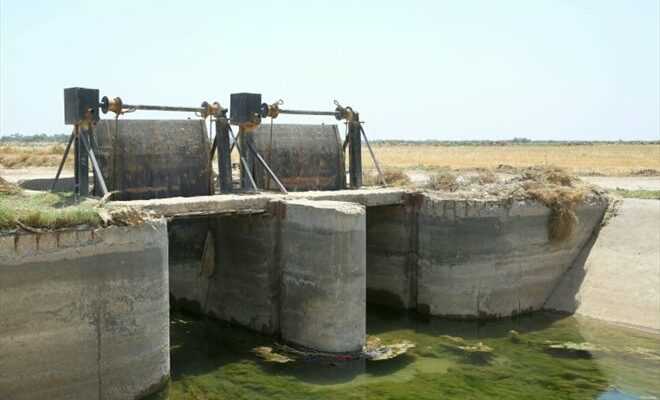Iraqi farmer Kamel Hamed harvests wheat in his fields in the village of Jaliha on April 26, 2022 (AFP/Haidar INDHAR)
The golden wheat ears of Kamel Hamed wave languidly in the wind. But faced with this bucolic landscape in central Iraq, the farmer does not hide his anguish: between drought and water shortages, his harvest has been halved.
“The drought is incredible at the moment. Even in the wells, the water cannot be used. It’s salt water,” said Mr. Hamed, in a white dishdasha, his head covered by a keffiyeh.
And since February, the repercussions of the war in Ukraine have been felt even in its fields near the village of Jaliha: the prices of fuel, fertilizers and seeds have risen sharply. What to explode its production costs.
Like all farmers in Iraq, Kamel Hamed follows the directives of the authorities, who buy his cereals. They determine the areas planted and the level of irrigation, depending on water reserves and rainfall.

A wheat field in the village of Jaliha in central Iraq on April 26, 2022 (AFP/Haidar INDHAR)
This year, due to water shortage, Iraq has halved the cultivated areas. Mechanically, crops have dropped.
Mr. Hamed has planted a quarter of his 100 donums (10 hectares). In his fields, the combine harvester makes methodical round trips to cut the ripe ears. The grains are projected into the dumpster of a truck.
“This year a single donum did not even provide us with 500 kilos of wheat,” laments the 53-year-old farmer. In previous seasons, it was one ton per donum.
The war in Ukraine has caused “the price of motor oils and high-yield seeds to soar”. “Another financial burden for farmers,” he sighs.
“I don’t know how to support my family,” adds Mr. Hamed. “No salary, no job, where can I go?”.
– “Abandon the earth” –
But the essential factor is water. An ultra-sensitive issue for Iraq and its 41 million inhabitants, who feel the impact of climate change on a daily basis: desertification, repeated sandstorms, falling rainfall and lower river levels.

Land cracked by drought in the agricultural region of Jaliha, central Iraq, on April 26, 2022 (AFP/Haidar INDHAR)
It is also a key geostrategic issue. Iraq shares the waters of several rivers, notably those of the Tigris and the Euphrates, with Turkey and Syria, but also Iran. Baghdad is headwind against the construction of dams upstream in its neighbors, which reduce the flow of rivers upon their arrival in Iraq.
Irrigated by the Euphrates, the province of Diwaniya, where Jaliha is located, normally receives 180 cubic meters of water per second. This year the level oscillates between “80 and 90 cubic meters”, deplores Hani Chaër, who leads a collective of farmers responsible for distributing the water.
Evidenced by the stagnant waters of the main irrigation canal of Tharima, serving the 200,000 donums of surrounding land. Some ditches are completely dry.
He also denounces the lack of support from the authorities. According to him, the Ministry of Agriculture provided only 5 kilos of fertilizer this season, compared to 40 kilos in previous years.
“The peasant will leave, abandon the land to go to town to find any job,” he regrets.
– “Zero agriculture” –

Stagnant water in the main irrigation canal in Tharima, Iraq, on April 26, 2022 (AFP/Haidar INDHAR)
The spokesman for the Ministry of Agriculture, Hamid al-Nayef, justifies himself by referring to the decision to increase the purchase price to pay producers around 500 dollars per ton.
In 2019 and 2020, wheat harvests reached five million tonnes, enough to guarantee “self-sufficiency” for Iraq, he told AFP.
This season, the country should have between 2.5 and 3 million tons of wheat. “Three million tonnes is not enough for an entire year for the Iraqis”, admits the spokesman. “It will be necessary to import”.
Iraq will be faced with the vagaries of the world market and rising prices, due to the conflict in Ukraine, even if Baghdad imports its cereals mainly from Canada, Australia and the United States.
“With the game of supply and demand, prices are increasing even in the United States or in other countries,” admits Mr. Nayef.
In his field in Jaliha, Ahmed Al-Jelhawi is questioning his life choices.
“I gave up studying to devote myself to agriculture,” laments the 30-year-old. “But this year, agriculture is zero.”
He once harvested 500 tons of wheat. This year it will be between 50 and 75 tonnes, he said. “Between low production and rising prices, it is likely that we will not be able to plant for next year.”
© 2022 AFP
Did you like this article ? Share it with your friends with the buttons below.




